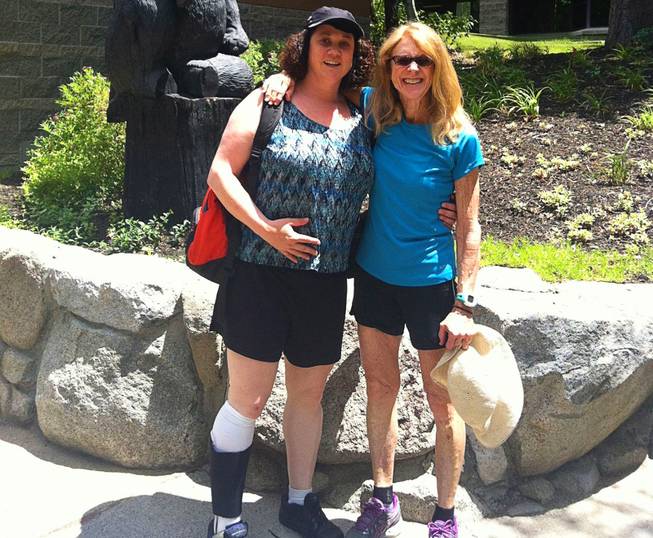
Courtesy Kim Palchikoff
Kim Palchikoff, left, and her mother, Gail, visit Squaw Valley, Calif. Kim says her mother is her biggest supporter.
Monday, July 25, 2016 | 2 a.m.
View more of the Sun's opinion section
View more of the Sun's opinion section
For all of us who have mental health issues — whether short term or for our entire lives — there’s one thing I know for sure: They cause a lot of uncertainty and instability, especially in the beginning when emotions can be overwhelming. It can be frightening when your mind is not at ease and isn’t reliable all the time, and you aren’t thinking clearly and are overreacting. It’s like a car that only sometimes works, and you never know whether it will until you try to drive off.
I’ve been dealing with issues of the mind for a long time. Like many others who have a physical or mental disability, I’ve developed coping methods, like tow trucks for the unreliable car.
Among them is to depend on “my people.” Mostly they are friends; a few are family members. They are my substitute minds, in a way. Over the years I’ve learned that mental illness is not a place for solitude and isolation. I frequently reach out and ask my people for their opinions. In fact, I’m not at my best when I’m trying to make all of my decisions by myself — what kind of career to pursue, what big purchases to make and how to somehow start exercising. I still haven’t figured that last one out. I can be impulsive more than the average Joe — that’s part of being bipolar — so I suppose it’s a good thing my mother taught me to never buy anything I can’t take back.
Meet Mom: She heads up my community of support. She says she’s on my imaginary “board of directors” because she probably knows me — and my disability — better than anyone else does. I run most of my big decisions by her. She grew up when women married young and had kids young, and family was the center of everything. Still, she has always stood out for her self-reliance and independence — traits I probably will never have.
But she has taught me a lot more than how to be a smart shopper. I credit her for imparting on me a love of travel and other cultures, and a keen understanding that not all of the world speaks English, lives in America and is white. From a young age, she encouraged me to learn Spanish, a language she mastered in college, because she had a gut feeling that the U.S. would one day be a bilingual country, and that by speaking Spanish I would always have a job. She just loved the poetic Hispanic culture and the mariachi music.
When I was young, she stirred my passion for writing. As a young divorcee she took my brother and me to live on a commune (kibbutz) in Israel, far from our relatives in California. She would buy me light-blue aerograms — sheets of light paper bearing postal stamp imprints that are designed to be mailed inexpensively — and I’d write endless descriptions of our life in the Middle East, my first attempts at writing a memoir. I wrote in cursive as small as I could, to squeeze as many words as possible on the thin piece of paper. She still is my No. 1 reader, the first to see my words in print. It’s not just a mother-daughter bonding exercise; she actually is a terrific editor and always makes good points in her critiques.
To her, and now to me, life is about helping others. She spent her career as a counselor doing a range of things such as counseling elementary schools children and families, supporting HIV-positive people and counseling American children living on military bases in Europe. She’s the kind of person who’s always inviting others over for dinner and taking them to the airport in the wee hours, and she frequently reminds me that one of life’s beauties is to love other people, be kind to them and help them out when they need it.
Many of my peers grew up with mothers like her, who wanted nothing more than for their daughters to grow up to be independent, to have our own jobs and money, and to be able to make our own decisions. Her generation of women saw their own lives transformed over the years.
Living with a disability, especially a mental illness, can often mean you’re not as independent as you’d like. Sometimes we’re clingy.
In my 20s, when I lived in Russia, the psychiatrists there used to recommend as part of my treatment that I get married. I used to pooh-pooh their advice, writing it off as antiquated Eastern European sexist foolishness.
But I’ve come to agree with those doctors: A key factor for anyone with a mental illness finding success is living with someone who loves them more than the moon. It could be a spouse; for me, it was — and is — Mom.
I haven’t thanked her enough for all that she has done for me. I know living with someone who has a disability can be a burden. But even though I failed her lesson on how to balance a checkbook, she has taught me one of the most important lessons parents can teach their children: how to be kind and loving to others.
Kim Palchikoff is studying social work at UNR and writes about mental health. Her Facebook page is NVMindsMatter.

Join the Discussion:
Check this out for a full explanation of our conversion to the LiveFyre commenting system and instructions on how to sign up for an account.
Full comments policy